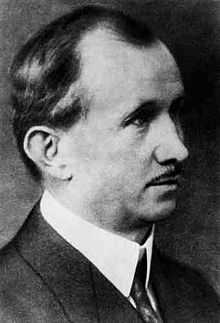Jakob Meisenheimer
From Wikipedia, the free encyclopedia
| Jakob Meisenheimer | |
|---|---|
 Jakob Meisenheimer | |
| Born |
June 14, 1876 Griesheim (Frankfurt am Main), German Empire |
| Died |
December 2, 1934 (aged 58) Tübingen, Germany |
| Residence | Germany |
| Nationality | German |
| Institutions |
University of Munich, University of Greifswald, University of Tübingen |
| Alma mater | University of Munich |
| Doctoral advisor | Friedrich Karl Johannes Thiele |
| Known for |
Meisenheimer complex, Mechanism of the Beckmann rearrangement |
Jakob Meisenheimer (14 June 1876 – 2 December 1934) was a German chemist. He made numerous contributions to organic chemistry, the most famous being his proposed structure for a group of compounds now named Meisenheimer complex.[1] He also proposed the mechanism of the Beckmann rearrangement. Later in his career, he reported the synthesis of the pyridine-N-oxide.
References
- ↑ Jakob Meisenheimer (1902). "Ueber Reactionen aromatischer Nitrokörper". Justus Liebigs Annalen der Chemie 323 (2): 205–246. doi:10.1002/jlac.19023230205.
- "Verein Deutscher Chemiker: Jakob Meisenheimer". Angewandte Chemie 48 (2): 55–56. 1935. doi:10.1002/ange.19350480209.
|
This article is issued from Wikipedia. The text is available under the Creative Commons Attribution/Share Alike; additional terms may apply for the media files.